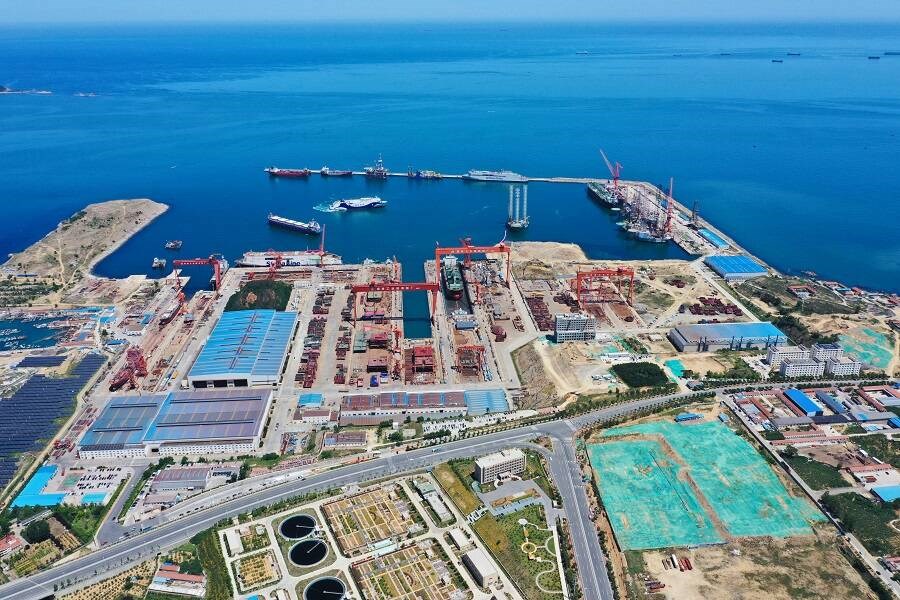The largest shipyard in Canada is criticizing BC Ferries for a flawed procurement process it says was tilted from the start to award new ship construction contracts to the government of China.
Davie shipyard, the oldest and highest-capacity shipyard in the country, says BC Ferries never gave Canadian builders a real chance at competing for the billion-dollar contract to build four new large ships.
“Unfortunately, the procurement criteria were heavily weighted toward the lowest price, effectively favouring Chinese shipyards,” CEO James Davies wrote in a letter to Quebec MP Xavier Barsalou-Duval, the vice-chair of the federal transportation committee investigating the purchase.
“Davie made considerable efforts to balance the procurement criteria by requesting recognition of Canadian content and innovation-proposals that B.C. Ferries summarily rejected.
“Due to the inherent price disadvantage caused by massive state subsidies for Chinese shipyards, coupled with low wages, weak environmental standards, and minimal labour protections, no Canadian or Western shipyard could reasonably compete, leaving us with no choice but to withdraw.”
BC Ferries has faced national backlash for its decision to contract with a state-owned Chinese shipyard at a time when China is attacking Canada’s economy with crippling economic tariffs, faces accusations of interfering in Canadian elections and is arming Russia in its illegal occupation of Canadian ally Ukraine.
The deal also undermines federal and provincial pledges to build critical infrastructure in Canada, and longstanding promises to grow a domestic shipbuilding industry.
BC Ferries has said no Canadian shipyards bid on construction, and it would have cost up to $1.2 billion more to select a democratic European country to do the work.
North Vancouver-based Seaspan, the country’s other major shipbuilder, has already echoed many of the concerns in the Davie letter, including that the design of BC Ferries’ procurement did not place enough emphasis on Canadian industry and left it unable to compete with the ultra-low costs of countries with lesser labour standards, like China.
Whether BC Ferries’ new ships will be built using forced Chinese labour, or even child labour, was one of the questions BC Ferries’ CEO Nicolas Jimenez faced during an appearance in front of the transportation committee earlier this month. Jimenez insisted China—an authoritarian regime with a poor human rights record—would now follow the rules due to the terms in its contract with BC Ferries.
Davies’ letter to MPs reiterated concerns already expressed by national security experts that China is using ferry contracts to build capacity at dual-use military shipyards, with the ultimate goal of more efficiently building troop carriers for military purposes such as invading Taiwan.
“It is critical to recognize that China's dominance in shipbuilding is not an outcome of genuine market competitiveness,” wrote Davie, whose operations are based in Quebec and Finland.
“Rather, it reflects a strategic, state-driven initiative. In 2000, China constructed only five per cent of global shipping tonnage; today, it exceeds 65 per cent. This rapid growth aligns with a broader strategy aimed at dominating maritime logistics and expanding geopolitical influence.
“Many shipyards engaged in commercial construction are dual-use facilities, simultaneously supporting China's naval expansion. Awarding Canadian vessel contracts to these entities unintentionally supports the growth of China's military-industrial complex, increasing Canada's reliance on a nation whose strategic objectives often diverge from our own.”
Conservative MPs slammed BC Ferries in the wake of Davies’ letter, and reiterated demands the federal and provincial governments stop the provincially owned ferry company from going through with the deal.
“It increasingly appears BC Ferries deliberately structured the bidding process in a way so that Canadian companies — who had the capability to build the ships — had no chance of being selected,” North Island-Powell River MP Aaron Gunn posted on social media.
The Opposition federal Conservatives are also demanding the Canada Infrastructure Bank pull its $1 billion loan to BC Ferries.
BC Ferries rejected Davies’ criticism, suggesting it mischaracterized the request for proposal criteria and its letter was unprofessional.
“Contrary to Davie’s claims that we ‘summarily rejected’ their proposals, we are not aware of any concrete requests or suggestions from Davie to amend our procurement criteria,” BC Ferries said in a statement.
“BC Ferries’ shipbuilding team visited Davie’s shipyard twice in 2022 and 2023 to discuss the upcoming program, but no specific recommendations were provided by Davie at those meetings or afterward. Without a formal proposal from Davie, we were unable to consider their capability to do this kind of work.”
Premier David Eby has refused to intervene in the BC Ferries decision, saying the public simply wants ships built quickly and cheaply. Federal ministers have also declined to overturn the contract.
A consortium of BC NDP organized-labour allies, including the BC Steelworkers and BC Federation of Labour, have launched a public campaign to try and convince Eby to change his mind and force BC Ferries to award the contracts to Canadian firms.
MPs on the transportation committee have ordered BC Ferries and governments to produce internal documents on its deal with China by Aug. 28.
Rob Shaw has spent more than 17 years covering B.C. politics, now reporting for CHEK News and writing for The Orca/BIV. He is the co-author of the national bestselling book A Matter of Confidence, host of the weekly podcast Political Capital, and a regular guest on CBC Radio.
🚨New newsletter alert! Stay ahead of the curve in B.C. politics. Get expert political analysis delivered straight to your inbox, plus inside scoops and other stories from across the province. Sign up here for the Capital & Coast newsletter.




